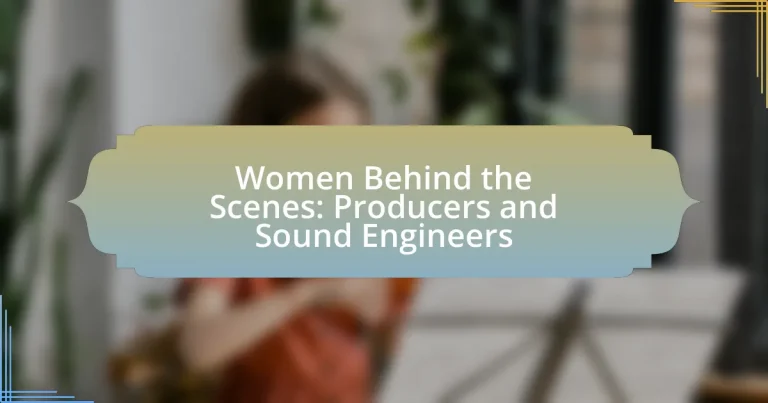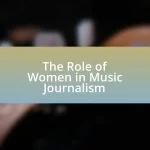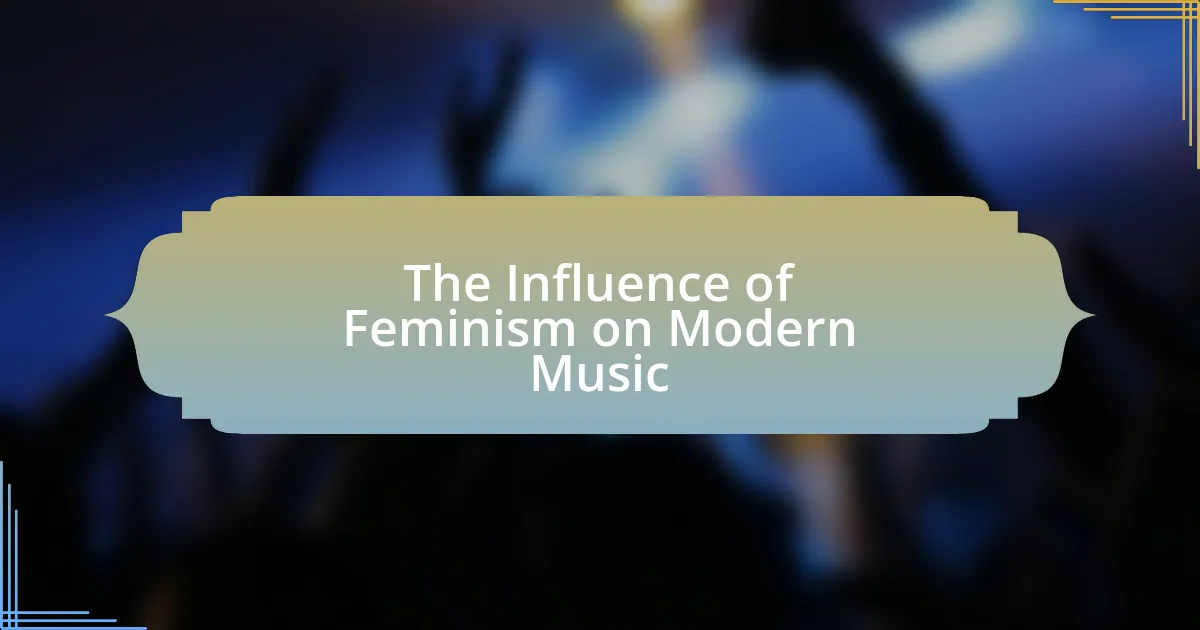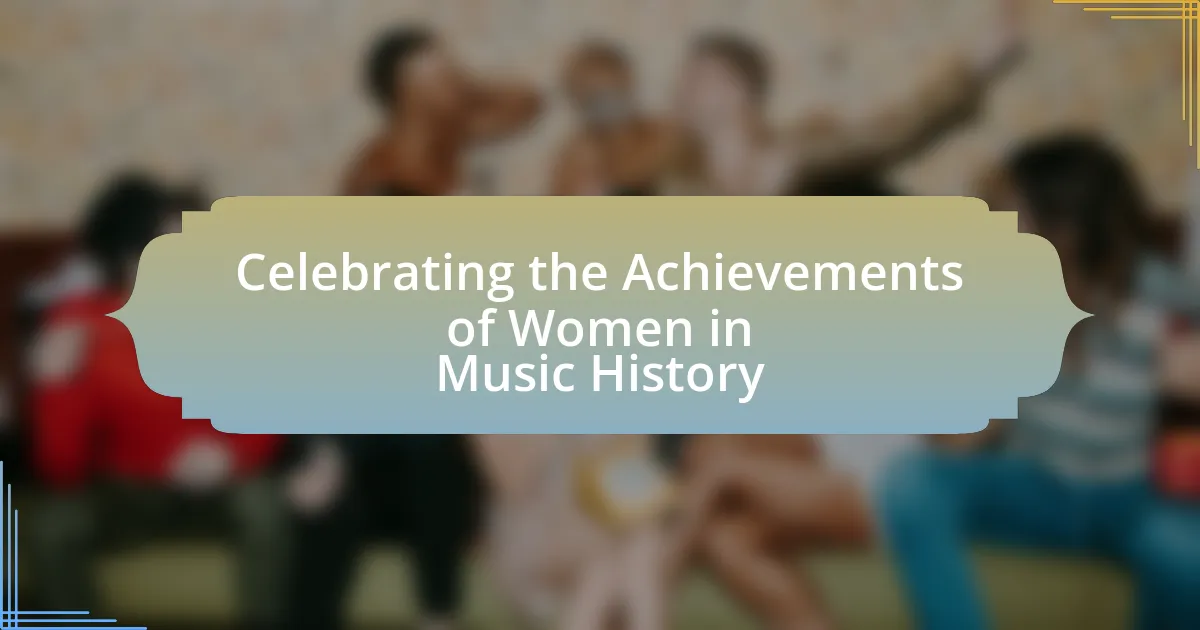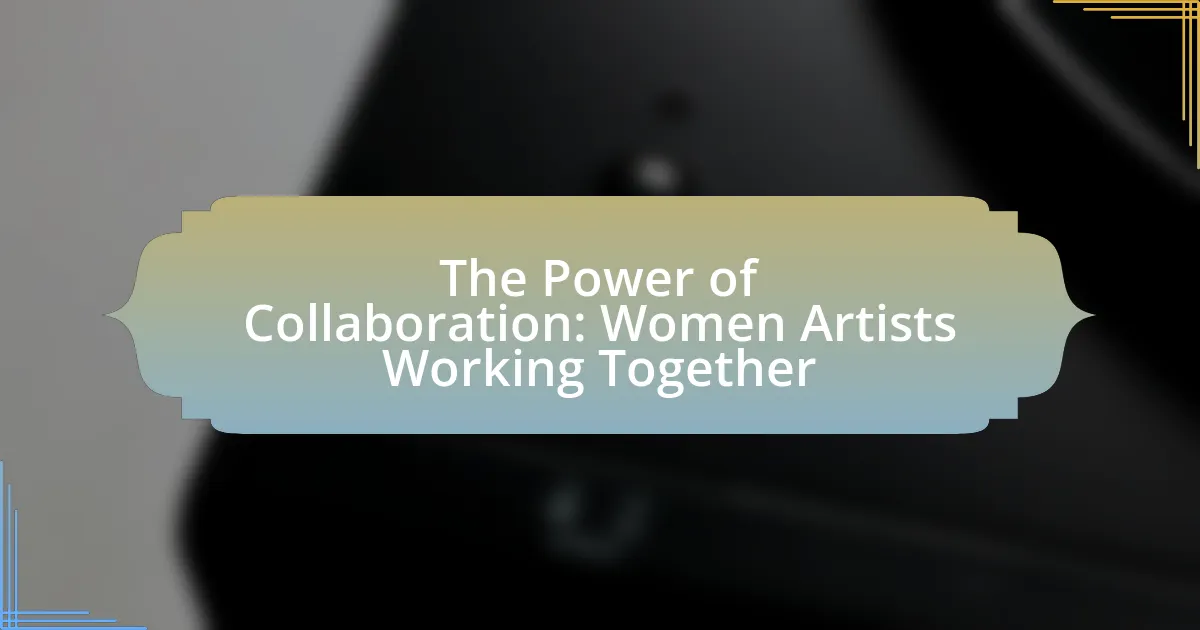The article focuses on the significant contributions of women in the fields of production and sound engineering, highlighting key figures such as Sylvia Massy and Leslie Ann Jones. It explores the diverse roles women occupy, the evolution of their contributions over time, and the challenges they face, including gender bias and underrepresentation. The importance of representation for fostering diversity and innovation is emphasized, along with the skills and qualifications necessary for success in these roles. Additionally, the article discusses the impact of female-led projects on industry standards and the benefits of mentorship and networking for women aspiring to advance in these fields.
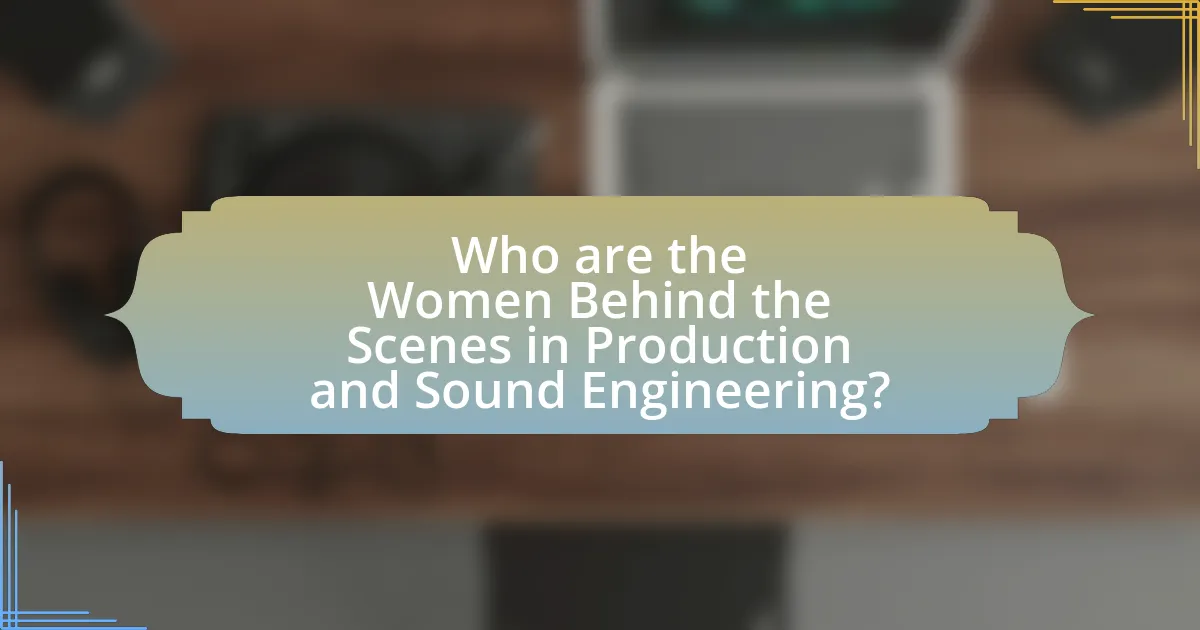
Who are the Women Behind the Scenes in Production and Sound Engineering?
Women behind the scenes in production and sound engineering include notable figures such as Sylvia Massy, who is known for her work with artists like Tool and System of a Down, and Leslie Ann Jones, a prominent sound engineer at Skywalker Sound. These women have significantly impacted the industry, breaking barriers and contributing to the sound of major films and music albums. For instance, Sylvia Massy has been recognized for her innovative recording techniques, while Leslie Ann Jones has received multiple awards for her sound design work, showcasing the vital roles women play in these fields.
What roles do women play in the production and sound engineering fields?
Women play diverse and significant roles in the production and sound engineering fields, including positions such as producers, sound engineers, and audio technicians. These roles involve overseeing the creative process, managing recording sessions, and ensuring high-quality sound production. According to a 2021 report by the Annenberg Inclusion Initiative, women accounted for 21.7% of producers and 12.3% of engineers in popular music, highlighting their growing presence in these traditionally male-dominated areas. Additionally, organizations like Women in Music and SoundGirls provide resources and support to empower women in these roles, fostering a more inclusive industry.
How have women’s contributions evolved in these industries over time?
Women’s contributions in the fields of production and sound engineering have significantly evolved from being largely unrecognized to becoming integral to the industry. Historically, women faced barriers to entry, often relegated to roles with limited influence, such as secretarial positions or support staff. However, over the decades, their roles have expanded, with women like Sylvia Massy and Linda Perry breaking through as prominent producers and sound engineers, demonstrating their technical expertise and creative vision.
By the 1990s and 2000s, initiatives aimed at promoting gender equality in the music industry began to gain traction, leading to increased visibility and opportunities for women. According to a 2020 report by the Annenberg Inclusion Initiative, women represented only 2.6% of producers across popular music, highlighting the ongoing challenges. Nevertheless, organizations such as Women in Music and She Is the Music have emerged to support and empower women in these roles, fostering a more inclusive environment.
As a result, women’s contributions have transitioned from marginalization to recognition, with a growing number of women now holding key positions in production and sound engineering, shaping the sound of contemporary music.
What challenges do women face in these roles?
Women in roles as producers and sound engineers face significant challenges including gender bias, lack of representation, and limited access to networking opportunities. Gender bias manifests in the form of stereotypes that question women’s technical abilities and leadership skills, often leading to their contributions being undervalued. According to a 2020 report by the Annenberg Inclusion Initiative, women comprised only 2.6% of producers and 3.4% of sound engineers in the music industry, highlighting the stark underrepresentation. Additionally, women often encounter barriers in networking, as industry events and informal gatherings may be male-dominated, limiting their ability to build essential professional relationships. These challenges collectively hinder women’s career advancement and recognition in the field.
Why is representation of women important in production and sound engineering?
Representation of women in production and sound engineering is crucial for fostering diversity, innovation, and equality within the industry. Diverse teams lead to a broader range of perspectives, which enhances creativity and problem-solving. Research indicates that gender-diverse teams are 15% more likely to outperform their counterparts, as shown in a study by McKinsey & Company in 2020. Furthermore, increased representation helps to challenge stereotypes and break down barriers, encouraging more women to pursue careers in these fields. This shift not only promotes gender equality but also enriches the cultural landscape of media and entertainment, making it more reflective of society as a whole.
How does diversity impact creativity and innovation in these fields?
Diversity significantly enhances creativity and innovation in the fields of production and sound engineering by bringing together varied perspectives and experiences. This amalgamation of different viewpoints fosters unique problem-solving approaches and encourages out-of-the-box thinking, which is crucial in creative industries. Research by the McKinsey & Company report titled “Diversity Wins: How Inclusion Matters” indicates that companies with diverse teams are 35% more likely to outperform their less diverse counterparts in terms of financial performance. Furthermore, a study published in the Harvard Business Review found that diverse teams are more innovative, as they generate a wider range of ideas and solutions. Thus, diversity not only enriches the creative process but also drives innovation in production and sound engineering.
What are the benefits of having women in leadership positions in production and sound engineering?
Having women in leadership positions in production and sound engineering enhances creativity, diversity, and innovation within the industry. Research indicates that diverse leadership teams are more effective at problem-solving and generating new ideas, as they bring varied perspectives and experiences to the table. For instance, a study by McKinsey & Company found that companies in the top quartile for gender diversity on executive teams were 21% more likely to experience above-average profitability. Furthermore, women’s leadership can foster a more inclusive workplace culture, which can lead to higher employee satisfaction and retention rates. This inclusive environment encourages collaboration and can improve overall project outcomes, as evidenced by various successful productions led by women in these roles.

What Skills and Qualifications are Essential for Women in These Roles?
Essential skills and qualifications for women in roles as producers and sound engineers include technical proficiency in audio equipment, strong communication abilities, and project management skills. Technical proficiency is critical as it enables women to operate sound mixing consoles, recording devices, and editing software effectively. Communication skills are vital for collaborating with artists, crew members, and stakeholders to ensure a cohesive production process. Project management skills help in organizing schedules, budgets, and resources efficiently. According to the 2021 Women in Music report by the Annenberg Inclusion Initiative, women represent only 2% of producers in the music industry, highlighting the need for targeted skill development and qualifications to increase female representation in these roles.
What educational paths lead to careers in production and sound engineering?
Careers in production and sound engineering typically require educational paths that include degrees in audio engineering, music production, or related fields. Many institutions offer specialized programs that focus on technical skills, such as sound design, mixing, and mastering, which are essential for success in the industry. Additionally, hands-on experience through internships or workshops is crucial, as it provides practical knowledge and networking opportunities. According to the Bureau of Labor Statistics, formal education combined with experience significantly enhances job prospects in this competitive field.
Which technical skills are most valuable for women in these positions?
The most valuable technical skills for women in producer and sound engineer positions include audio editing, mixing, and mastering, as well as proficiency in digital audio workstations (DAWs) like Pro Tools and Logic Pro. Mastery of these skills enables effective sound manipulation and production, which are critical in the music and film industries. According to a report by the Annenberg Inclusion Initiative, women in music production often face barriers, but those who possess strong technical skills in these areas are more likely to succeed and gain recognition in a male-dominated field.
How can women develop leadership skills in a male-dominated industry?
Women can develop leadership skills in a male-dominated industry by actively seeking mentorship, participating in networking opportunities, and pursuing continuous education. Mentorship provides guidance and support from experienced professionals, which is crucial for skill development and confidence building. Networking allows women to connect with peers and industry leaders, fostering relationships that can lead to collaborative opportunities and visibility. Continuous education, through workshops and courses, equips women with the latest industry knowledge and technical skills, enhancing their competence and leadership potential. Research indicates that women who engage in these activities are more likely to advance in their careers and take on leadership roles, as evidenced by a study from McKinsey & Company, which found that women with mentors are 25% more likely to be promoted.
What certifications or training programs are available for aspiring female producers and sound engineers?
Aspiring female producers and sound engineers can pursue various certifications and training programs to enhance their skills and knowledge. Notable options include the Berklee College of Music’s online courses in music production and sound engineering, which provide comprehensive training in audio production techniques. Additionally, the SAE Institute offers diploma programs in audio engineering that focus on practical skills and industry-standard practices. The Women’s Audio Mission provides specialized training programs aimed at empowering women in audio, including workshops and mentorship opportunities. These programs are designed to equip women with the necessary skills to succeed in the male-dominated fields of production and sound engineering.
Which organizations support women in gaining these qualifications?
Organizations that support women in gaining qualifications in production and sound engineering include Women in Music, the Audio Engineering Society, and She Is the Music. Women in Music provides networking opportunities, scholarships, and educational resources specifically aimed at women in the music industry. The Audio Engineering Society offers mentorship programs and workshops designed to enhance technical skills for women. She Is the Music focuses on increasing the representation of women in music creation and provides resources for education and career advancement. These organizations collectively contribute to empowering women in the audio and music production fields.
How do mentorship programs benefit women in these fields?
Mentorship programs benefit women in the fields of production and sound engineering by providing essential guidance, networking opportunities, and skill development. These programs connect women with experienced professionals who can share industry insights, helping to navigate challenges and enhance career growth. Research indicates that women with mentors are more likely to advance in their careers, as they receive personalized advice and support tailored to their specific needs. For instance, a study by the American Association of University Women found that mentorship significantly increases women’s confidence and job satisfaction in male-dominated fields, leading to higher retention rates and professional success.
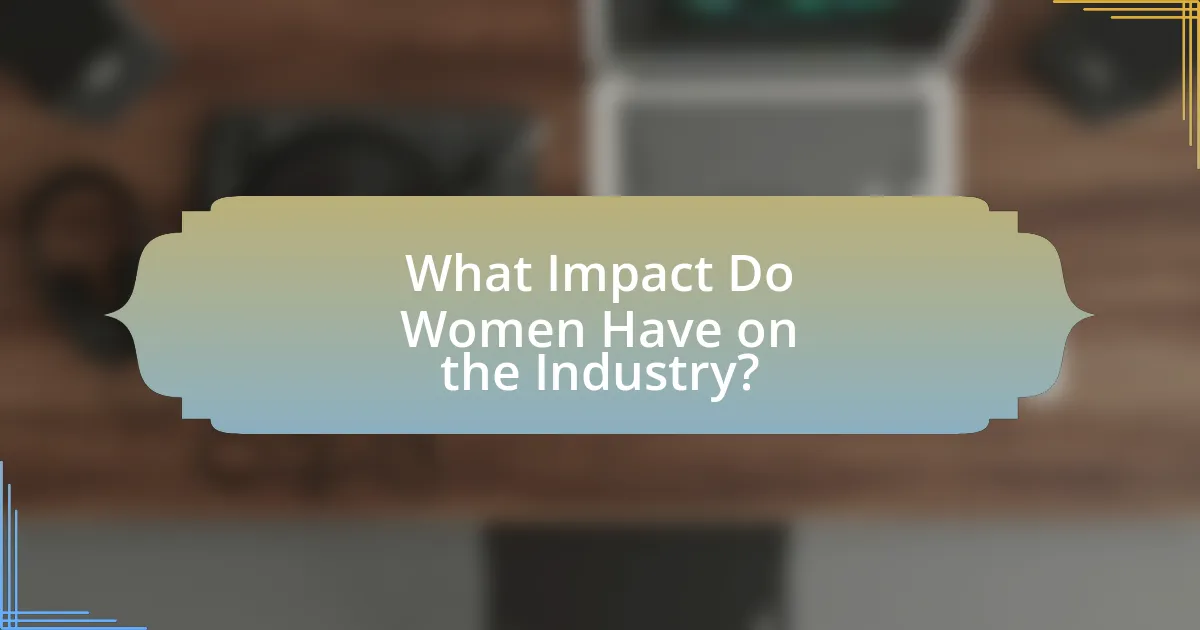
What Impact Do Women Have on the Industry?
Women significantly impact the industry by bringing diverse perspectives and innovative approaches to production and sound engineering. Their involvement has led to a more inclusive environment, fostering creativity and collaboration. For instance, a study by the Annenberg Inclusion Initiative found that films with female directors tend to have more female characters and a broader range of stories, which enhances audience engagement and representation. Additionally, women in technical roles contribute to the development of new technologies and techniques, improving overall production quality. This shift not only challenges traditional gender roles but also drives economic growth within the industry, as diverse teams are proven to outperform homogeneous ones.
How do female producers and sound engineers influence the creative process?
Female producers and sound engineers influence the creative process by bringing diverse perspectives and innovative approaches to music production. Their unique experiences often lead to different artistic choices, fostering collaboration and enhancing the overall sound. Research indicates that gender diversity in creative teams can improve problem-solving and creativity, as seen in studies by the Harvard Business Review, which found that diverse teams outperform homogeneous ones in innovation. Furthermore, female producers often advocate for underrepresented voices in music, contributing to a richer and more inclusive creative landscape.
What unique perspectives do women bring to production and sound design?
Women bring diverse perspectives to production and sound design through their unique experiences and insights, which often lead to innovative storytelling and soundscapes. Research indicates that women tend to emphasize collaboration and emotional resonance in their work, fostering inclusive environments that enhance creativity. For instance, a study by the Annenberg Inclusion Initiative found that films with female directors often feature more complex female characters and narratives, demonstrating how women’s viewpoints can enrich content. Additionally, women in sound design frequently prioritize nuanced audio elements that reflect a broader range of human experiences, contributing to more authentic and relatable productions.
How have female-led projects changed industry standards?
Female-led projects have significantly changed industry standards by promoting diversity and inclusivity in production roles. Research indicates that films and shows directed by women tend to feature more female characters and address gender-related issues, leading to a broader representation in storytelling. For instance, a study by the Geena Davis Institute on Gender in Media found that female-led films have a 20% higher chance of featuring female protagonists compared to male-led films. This shift not only influences the narratives presented but also encourages industry stakeholders to prioritize gender equity in hiring practices, ultimately reshaping the landscape of media production.
What are some notable achievements of women in production and sound engineering?
Women in production and sound engineering have achieved significant milestones, including the first female winner of a Grammy Award for Best Engineered Album, which was awarded to Wendy Carlos in 1970 for “Switched-On Bach.” Additionally, Sylvia Massy, known for her work with artists like Tool and System of a Down, has been recognized for her innovative techniques in recording and producing. In film, sound designer and mixer Renée Glover won an Emmy Award for her work on “The Amazing Race,” showcasing the impact of women in television sound engineering. Furthermore, women like Leslie Ann Jones have made history as the first female chief engineer at Skywalker Sound, demonstrating leadership in a predominantly male industry. These achievements highlight the critical contributions of women in shaping the landscape of production and sound engineering.
Which women have made significant contributions to the industry?
Women such as Sylvia Massy, Linda Perry, and Trina Shoemaker have made significant contributions to the music production and sound engineering industry. Sylvia Massy is known for her innovative work with artists like Tool and System of a Down, showcasing her expertise in producing and engineering. Linda Perry, a former lead singer of 4 Non Blondes, has produced numerous hit songs for artists like Pink and Christina Aguilera, demonstrating her impact on mainstream music. Trina Shoemaker became the first woman to win a Grammy Award for Best Engineered Album, Non-Classical, for her work on Sheryl Crow’s “Tuesday Night Music Club,” highlighting her influence in sound engineering. These women have not only shaped the sound of contemporary music but have also paved the way for future generations of female producers and engineers.
What awards and recognitions have women in these roles received?
Women in the roles of producers and sound engineers have received numerous awards and recognitions, including the Grammy Awards, where women like Sylvia Massy and Leslie Ann Jones have been acknowledged for their contributions to music production and engineering. Additionally, the Producers Guild of America has honored women such as Gale Anne Hurd and Shonda Rhimes with the Visionary Award, recognizing their significant impact in the industry. Furthermore, the Women in Film organization presents the Crystal + Lucy Awards, which have celebrated women like producer and director Ava DuVernay for her achievements in film production. These awards highlight the essential roles women play in shaping the entertainment industry.
What practical steps can women take to succeed in production and sound engineering?
Women can succeed in production and sound engineering by actively seeking education and training in audio technology, networking within the industry, and gaining hands-on experience through internships or entry-level positions. Educational programs, such as those offered by institutions like Berklee College of Music and SAE Institute, provide foundational knowledge and technical skills essential for the field. Networking is crucial; attending industry events, joining organizations like Women in Audio, and connecting with mentors can open doors to opportunities. Additionally, practical experience is vital; women should pursue internships or volunteer positions to build their portfolios and gain real-world insights, as studies show that hands-on experience significantly enhances job readiness in technical fields.
How can networking enhance opportunities for women in these fields?
Networking can significantly enhance opportunities for women in the fields of production and sound engineering by providing access to mentorship, collaboration, and industry insights. Through networking, women can connect with established professionals who can offer guidance and support, which is crucial in male-dominated industries. For instance, a study by the Women’s Media Center found that women in media who engage in networking are more likely to receive job referrals and mentorship, leading to increased career advancement opportunities. Additionally, networking events and organizations specifically aimed at women in these fields foster a sense of community, enabling women to share resources and experiences that can lead to collaborative projects and job opportunities.
What strategies can women use to overcome barriers in the industry?
Women can overcome barriers in the industry by leveraging networking, mentorship, and skill development. Networking allows women to build relationships with industry professionals, which can lead to job opportunities and collaborations. Mentorship provides guidance and support from experienced individuals, helping women navigate challenges and gain insights into the industry. Skill development through workshops, training programs, and hands-on experience enhances technical abilities and boosts confidence. According to a study by the Geena Davis Institute on Gender in Media, women who engage in mentorship are more likely to advance in their careers, highlighting the effectiveness of these strategies.
